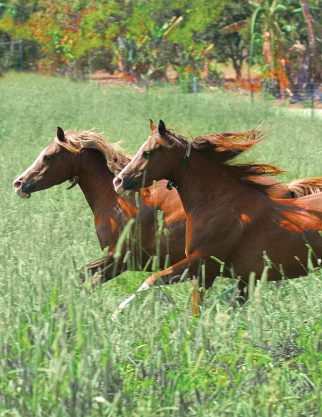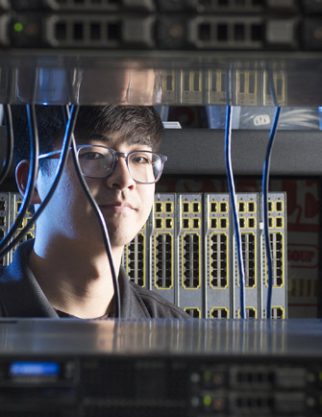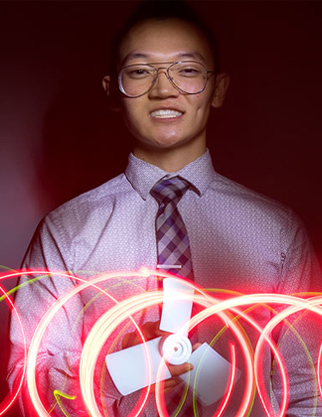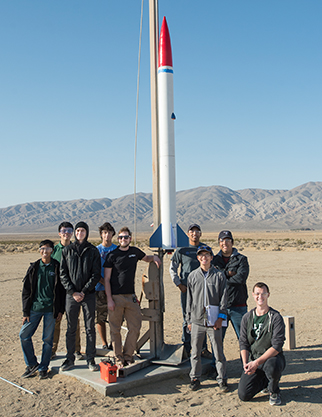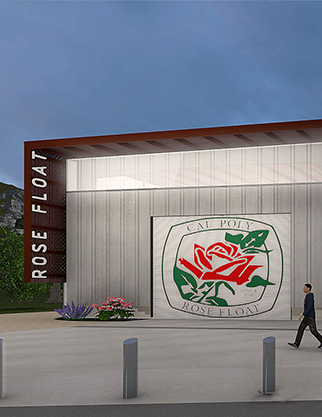Demetrious Jarvis was standing on a Navy aircraft carrier flight deck when he heard a loud noise that made him drop belly down to the floor. He turned over to see a few of his Navy crew members laughing at him and a ship mate yelling to pay attention to the incoming landing fighter jets.
“The noise scared me, but when I gathered myself there was this powerful fighter jet with full afterburner and the arresting gear locked on,” said Jarvis. “The sound of the plane and the feeling I had, I was like, ‘Wow, I think I love this.’”
That was 17 years ago when he found his purpose in life: to work with planes.
Now, Jarvis is graduating from Cal Poly Pomona with a degree in aerospace engineering and will work at Skunk Works – an organization that produces and develops aircraft designs – as a flutter and vibrations engineer, testing for vibrations and stress on airplanes, missiles, rockets and other advanced development projects.
It was through his persistence to have a better future for himself and his desire to contribute to society that pushed him through the challenges he faced throughout his life to reach his goal.
“Even when I was told I couldn’t do it, that I’m not good enough to get that job because I didn’t have an engineering degree, I had to walk away from it to come back to it,” Jarvis said. “I went from putting the chains and chalk on the plane to providing full-scale designs for customers. But it was a journey.”
Jarvis is no stranger to working hard. He grew up in Norfolk, Virginia, and dropped out of school in the ninth grade to help support his family – he was the second oldest of 15 siblings.
When Jarvis turned 17, his aunt and grandma took him to a military school for an eight-month program to earn his General Education Diploma, which he received in less than two months. As part of the program, he participated in leadership and community service opportunities for the next seven months. These experiences strengthened his confidence to lead and influence other students at the school, whom he helped to successfully complete the program, and he was inspired to enlist in military service.
“I was recruited heavily for the military out of that program, and it changed my life,” Jarvis said. “I care about leaving a legacy and a good future. I’m going to be gone one day and I hope that I can do something that helps humanity.”
Jarvis served in the Navy for more than four years and learned to maintain airplanes and fighter jets. He researched the aerospace industry to see how he could contribute and learned about Kelly Johnson, one of Skunk Works’ co-founders who produced innovative concepts, including the first fighter jet to exceed 400 mph. Inspired by how one man and one organization changed the world, Jarvis wanted to be a part of that mission.
Toward the end of Jarvis’ Navy contract, one of his chiefs advised him to find a job outside the military that would pay more for his skills. Jarvis took his chief’s advice and moved from the East coast to California to work on planes as a contractor.
Although he worked in the same company for four years, he was not qualified for certain promotions because he did not have a college degree, even though his skills and experiences would have allowed him to advance in his field. Jarvis quit his job and spent the next four years studying math and physics at Pasadena Community College and making up his high school courses.
“I didn’t have any SAT scores or AP credit. I went to junior college from classes I took from the Navy,” Jarvis said. “Transferring from junior college was scary because I didn’t think I could get into a university, but then I received offer letters for all the colleges I applied to and it made me believe in myself more.”
He applied to several universities to earn an engineering degree, the major roadblock preventing him from advancing in the aerospace industry. Out of all the universities he visited, he felt positive energy at Cal Poly Pomona once he stepped on campus, feeling that he was meant to be a Bronco and transferred in 2016 into aerospace engineering.
Jarvis never forgot where he discovered his dream and connected with the Veterans Resource Center on campus to with any issues, including ensuring that he was receiving his financial benefits on time. He was also connected with peers who understood his Navy background.
Completing school was another uphill battle for Jarvis, but his professors wanted him to recognize his full potential and pushed him to spend more time to improve his designs. Jarvis started to recognize that going above and beyond the minimum requirements is where innovations live, and this mentality must be the same work ethic that allowed Skunk Works founders to develop groundbreaking projects.
“When I first transferred here, I had a hard time because of my inability to meet the mark, thinking what I was doing was good enough, when in actuality it wasn’t good enough,” Jarvis said. “It’s like in the Navy, when you have to throw up while you’re running, you just throw up and run at the same time and keep going. That was how I felt like in school, just constantly running, running, running.”
Jarvis started to see the extra work pay off when he was a part of projects that allowed him to apply what he learned in the classroom to hands-on experiences.
Some of the courses he took allowed him to work with high- and low-speed wind tunnels to test the durability of aircraft wings, which led him in the direction to work as a flutter and vibrations engineer. His designs and calculations needed to be precise to ensure the safety of aircraft components, and he dedicated his time to understand how he could contribute to this field.
Jarvis also knew he wanted to work with rockets and joined the Undergraduate Missiles, Ballistics and Rocketry Association (UMBRA) to participate in competitions and explore the aerospace field. In 2019, he worked as the payload lead with a 25-person team that launched a 14-foot rocket 24,000 feet in the air. They won first place in the 2019 Friends of Amateur Rocketry (FAR) 1030 competition and set a school record. Jarvis credits his professors for teaching him to be persistent.
“The Navy showed me that I’m really good at working on airplanes and that I have a passion for fighter jets, but I didn’t know that I was really good with rockets until I got to Cal Poly Pomona,” Jarvis said. “Cal Poly Pomona allowed me to explore something as specific as vibrations on an aircraft, which helped me in exploring jobs.”
This year, he served as club president and ensured that UMBRA was a part of every campus event that Lockheed Martin – the aerospace, defense, security and technologies company that houses Skunk Works – participated in. Jarvis networked with managers from the company, who advised him to specialize in his engineering field.
After several online applications to Lockheed Martin were rejected, he upped his game and flew to Arizona for a conference and stood in line for an opportunity to meet in-person with a hiring manager. A Lockheed Martin representative who had also attended Cal Poly Pomona events recognized him and took his application. Jarvis had an interview the next morning, and he was offered the position to be a flutter and vibrations engineer at Skunk Works in Southern California.
“I actually needed a master’s degree for the position that I was applying for, but because Cal Poly Pomona offered wind tunnel classes and hands-on opportunities, I qualified for the job,” Jarvis said. “What I did with wind tunnels on campus, I’ll be doing at Skunk Works but on a bigger scale with real airplanes.”
Jarvis never let a challenge prevent him from reaching his goal. He is determined to be a model for his younger siblings and show them that they can reach their dreams through determination and education.
“The Navy definitely taught me endurance and to be mentally tough when you’re going through challenges,” Jarvis said. “Just being resilient and constantly hitting the wall until you crack it and then you can go through it. And now, I reached a dream that I’ve had for 17 years, so I’m happy.”

